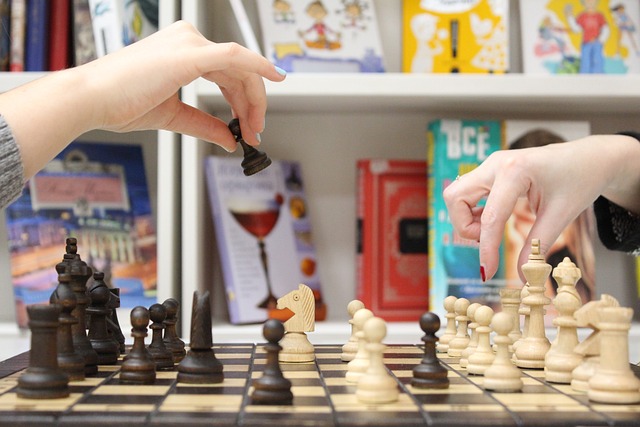While cheating is generally frowned upon in competitive environments, this guide aims to shed light on alternative approaches and unorthodox methods that challenge traditional chess norms.
Chess, renowned for its depth and complexity, has captivated minds for centuries. It’s a game of strategy, foresight, and intricate decision-making. However, sometimes the desire to gain an advantage or turn the tides in your favor may lead to exploring unconventional avenues.
In this guide, we delve into the realm of chess cheating from a different perspective. We will explore various techniques, mind games, and strategies that defy the conventional rules of fair play. While it’s important to emphasize that cheating goes against the principles of integrity and sportsmanship, understanding these tactics can enhance your chess knowledge and appreciation for the game.
Is It Possible to Cheat in Chess?
Chess, known for its deep complexity and strategic gameplay, is a game that relies heavily on the honesty and integrity of its players. However, despite the game’s reputation for fair play, it is indeed possible to cheat in chess.
With the advancement of technology and the availability of powerful chess engines and analysis software, players can surreptitiously seek assistance during games, gaining an unfair advantage over their opponents. From discreetly consulting chess engines on a smartphone to using hidden earpieces or receiving signals from accomplices, various methods have been employed to cheat in this intellectual battle of wits.
What Motivates Players to Cheat in Chess?
The motivations behind chess cheating can vary from individual to individual. Some players may succumb to the allure of success and the desire to achieve higher ratings or tournament placements. The competitive nature of chess, coupled with the pressure to win, can drive certain individuals to resort to dishonest practices.
Additionally, financial incentives and the possibility of monetary gains through gambling or betting on chess games may entice players to cheat. Furthermore, the fear of losing or the lack of confidence in one’s abilities can lead some individuals to cheat as a means of compensating for their perceived shortcomings.

How Widespread is Chess Cheating?
The prevalence of chess cheating has become a growing concern within the chess community. While it is challenging to determine the exact extent of cheating due to its clandestine nature, numerous cases have been reported and detected over the years.
Both amateur and professional chess tournaments have experienced instances of cheating, with players utilizing sophisticated technological aids or employing more traditional, low-tech methods. The widespread availability of chess engines, easily concealed electronic devices, and online communication platforms has undoubtedly contributed to the rise in cheating incidents in recent times.
Are There Different Types of Chess Cheating?
Chess cheating encompasses a range of tactics and methods employed to gain an unfair advantage. Technological methods involve utilizing chess engines, computer programs, or online analysis tools to analyze positions or suggest moves during a game.
In contrast, traditional methods may include collusion with an accomplice who provides covert signals or assistance during play. Other forms of cheating may involve tampering with the chessboard, manipulating physical pieces, or employing distractions to disrupt opponents’ concentration. Each method poses its own challenges for detection and prevention.

What Are the Consequences of Chess Cheating?
The consequences of chess cheating can be severe and far-reaching. In addition to tarnishing the cheater’s reputation and credibility, cheating undermines the integrity of the game itself. In professional chess, players found guilty of cheating may face significant penalties, including bans from competitive play, loss of titles, and financial repercussions.
The consequences extend beyond individual players, affecting the reputation and trustworthiness of chess organizations and tournaments. Moreover, cheating erodes the trust and fairness that are vital for maintaining the competitive spirit and enjoyment of the game for all participants.
How Can Chess Cheating be Detected?
Detecting chess cheating is a challenging task, as cheaters often employ sophisticated methods to remain undetected. However, chess organizations and tournament organizers have implemented various measures to combat cheating. These measures include employing advanced anti-cheating software to analyze players’ moves in real-time, monitoring player behavior and performance patterns, and conducting thorough post-game analysis.
Additionally, physical inspections, random checks, and strict regulations during tournaments help deter potential cheaters. The vigilance and cooperation of players, officials, and the chess community as a whole play a crucial role in identifying and exposing instances of cheating, ensuring the integrity of the game is upheld.
Can Technology Help in Preventing Chess Cheating?
Technology can play a significant role in preventing chess cheating. While it has undoubtedly contributed to the rise in cheating incidents, advancements in technology can also be harnessed to develop effective anti-cheating measures. Chess organizations and software developers have been working on sophisticated algorithms and anti-cheating software that can analyze players’ moves in real time and flag suspicious behavior.
These tools can detect patterns, anomalies, and correlations that may indicate cheating. Additionally, online platforms have implemented measures to detect and prevent cheating, such as monitoring IP addresses, analyzing game data, and employing machine learning algorithms to identify cheating patterns.
Are There Ethical Dilemmas in Chess Cheating?
Chess cheating raises a host of ethical dilemmas that challenge the fundamental principles of fair play and integrity. Cheating not only violates the trust of opponents but also compromises the essence of the game itself. Chess is revered for its intellectual depth and the purity of the competition it represents.
When players resort to dishonest practices, it undermines the spirit of fair play, fairness, and sportsmanship that chess is built upon. Cheating introduces an unfair advantage that disrupts the balance and equality of the game, eroding the principles that make chess a revered pursuit of intellectual prowess.
How Does Chess Cheating Impact the Integrity of the Game?
Chess cheating has a profound impact on the integrity of the game. It casts doubt on the authenticity of results and undermines the trust between players. When cheating occurs, it creates a sense of injustice and unfairness, leading to a loss of faith in the game and its participants.
The integrity of chess is not only compromised at the individual level but also at the collective level. The reputation of chess as a sport is at stake when cheating incidents come to light, potentially deterring new players from engaging in the game and causing sponsors and supporters to question their involvement.
| Types of Chess Cheating | Methods | |
|---|---|---|
| 1 | External Assistance | Using electronic devices or hidden communication |
| 2 | Collusion | Working with an accomplice or team |
| 3 | Pre-arranged Moves | Agreeing on predetermined moves |
| 4 | Positional Adjustments | Physically moving pieces during the game |
| 5 | Opening Book Access | Referring to a pre-loaded chess database |
What Measures Are Chess Organizations Taking to Combat Cheating?
Chess organizations have recognized the urgent need to combat cheating and have implemented various measures to safeguard the integrity of the game. They have invested in advanced anti-cheating technology, including powerful algorithms and software, to detect and deter cheating during tournaments and online play.
Physical inspections, random checks, and strict regulations are enforced to minimize the chances of cheating during competitive events. Additionally, educational campaigns and awareness programs are conducted to promote fair play and sportsmanship among players, emphasizing the importance of upholding the integrity of the game.
How Does Chess Cheating Affect Tournament Results?
Chess cheating can have significant implications for tournament results. When a player is found guilty of cheating, the consequences can be severe. If the cheating is discovered during or after a tournament, the player may face disqualification, loss of ranking points, and bans from future events.
In some cases, tournament organizers may decide to nullify the games played by the cheater, which can impact not only the cheater’s opponents but also the overall standings and prize distribution. The repercussions extend beyond individual players, as cheating can taint the legitimacy of tournament results and cast doubt on the fairness of the entire competition. Tournament organizers strive to uphold the integrity of their events and take decisive action to rectify the impact of cheating on the results.
Can Chess Cheating Be Justified in Certain Situations?
Chess cheating cannot be justified under any circumstances. While some individuals may attempt to rationalize cheating in specific situations, such as high-stakes competitions or intense pressure to succeed, it is essential to uphold the principles of fair play and integrity in the game.
Cheating undermines the essence of chess and goes against the fundamental values that it represents. Justifying cheating not only disregards the rules and spirit of the game but also erodes the trust and camaraderie among players. In chess, as in any other competitive activity, the pursuit of victory should always be guided by ethical conduct.

Are Chess Cheating Scandals on the Rise?
Chess cheating scandals have garnered significant attention in recent years, raising concerns about the prevalence of cheating in the game. While it is difficult to determine the exact frequency of cheating incidents, the accessibility of technology and the increasing sophistication of cheating methods have contributed to the visibility of these scandals.
High-profile cases involving professional players and the use of advanced technology have fueled discussions and prompted chess organizations to intensify their efforts to combat cheating. While scandals may generate negative headlines, they also serve as a reminder of the importance of maintaining the integrity of chess and implementing robust anti-cheating measures.
How Can Chess Players Protect Themselves from Cheating Attempts?
Chess players can take proactive measures to protect themselves from cheating attempts. One of the most effective strategies is to increase awareness and vigilance during games. Players should be mindful of any suspicious behavior from their opponents, such as excessive trips to the restroom, unusual eye movements, or irregular patterns of play.
Maintaining a focused mindset and not getting distracted by external factors can also help players stay attuned to the game and potential cheating attempts. It is essential to trust one’s instincts and report any suspicions to tournament officials or arbiters for investigation. Additionally, players can request anti-cheating measures, such as random checks or the use of anti-cheating technology, to ensure a fair playing environment.
Is There a Dark Underbelly of Chess Cheating Strategies?
Chess cheating strategies can delve into a dark and unethical realm. As cheating methods evolve, individuals with malicious intent may engage in practices that exploit vulnerabilities in the game’s regulations or deceive opponents. This can include using hidden electronic devices, employing advanced signaling systems, or colluding with accomplices.
The development of cheating communities and online platforms that facilitate the exchange of cheating techniques and tools further accentuates the dark underbelly of chess cheating. Such strategies not only undermine the integrity of the game but also demonstrate a disregard for the principles of fair play, sportsmanship, and mutual respect that should govern chess and any competitive endeavor.
Conclusion
As we reach the conclusion of “How to Cheat in Chess?”, it’s important to reflect on the lessons and insights gained throughout our exploration of unorthodox strategies. While this guide has delved into alternative approaches and mind games that challenge the traditional norms of fair play, it is crucial to emphasize that cheating is not condoned or encouraged in any form.
Chess is a game deeply rooted in principles of integrity, sportsmanship, and intellectual challenge. The pursuit of victory through fair play, strategic thinking, and honing one’s skills remains the essence of this timeless game. The joy of chess lies not in seeking shortcuts or exploiting weaknesses but in the genuine clash of ideas and the ability to outmaneuver opponents through skillful play.
By examining unconventional tactics, we have sought to broaden our understanding of the game and push the boundaries of strategic thinking. However, it is essential to maintain a strong moral compass and uphold the values of honesty, respect, and ethical conduct.




